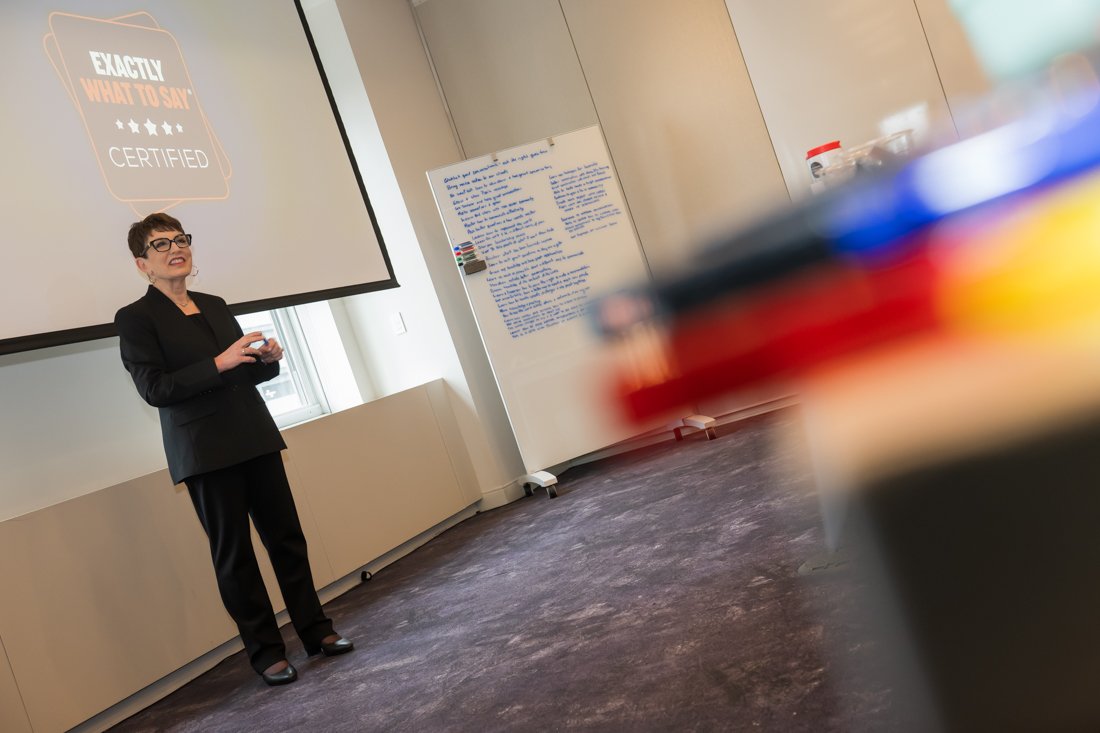Phil M. Jones has been teaching people how to run successful organizations for years. His tips and advice have helped scores of businesses to improve and reach their full potential.
Throughout the years, he’s found that there are certain questions that people ask all the time:
How did he get to be so good at what he does?
How is he so good at using positive language in moments that matter?
How does he know the secret to running a successful business?
To understand this, you only need to know his history. His origin story, if you will!
Phil M. Jones: The Early Years

Did you know that Phil started his first business at the tender age of 14? Determined to earn some extra cash, he knocked on the doors of his neighbors and offered to clean their cars.
Some would say yes, some would say no – but nearly everyone asked how much he’d do it for.
This taught him a precious lesson. When someone asks you how much you charge, they’re interested in what you’re selling.
If they’re interested, you’re guaranteed the business provided your prices are reasonable.
He found that car cleaning was a very lucrative venture. So lucrative that he quickly prioritized that over going to school, which, as you can imagine, landed him in quite a bit of trouble with his teachers.
He was completely undeterred and grew his business throughout his teens gaining regular customers and even taking on staff. When he was asked about his reasons for not attending school, he would explain that he had customers relying on him and staff that needed his direction.
Incredibly, he managed his studies alongside his business to such a high standard that at 18, he faced a pretty big dilemma: furthering his academic education or entering into the world of work.
Having received an unconditional university offer, he had to make the right choice for his future, and for him, it was pretty clear.
He didn’t want to continue with school. He loved to work, so that’s exactly what he did.
You Don’t Know What You Don’t Know
At 18, you’re in a beautiful situation. You don’t know what you don’t know, and this gift allowed Phil to grab a job usually earmarked for post-grads with all the right qualifications.
Within three weeks of leaving school, he did the unthinkable and became the youngest-ever sales manager for a leading UK department store, Debenhams.
He had a great few years working there, but after a while, he hit a glass ceiling.
The only way to get the next job was if someone working above you left or died. His boss was in great shape. You can see the dilemma.
Knowing that he was young and enthusiastic, they offered him a great opportunity to fix broken stores in the retail environment. His objective was to get them back to turning over the kinds of numbers they experienced in their hay day. He succeeded every single time.
Bosses would ask what his secret was, just how he was doing it? They wanted him to share the formula and teach it to others, and it was at this moment that he caught the training bug.
Catching The Training Bug
Natural trainers get far more satisfaction from other people’s success.
Over the years, Phil has perfected his training technique. With the huge success of Exactly What to Say, he now has a fleet of Certified Guides that further his tips and techniques to individuals, businesses, and organizations in many different professional fields.
Phil is determined to share everything he’s learned so that other people can benefit and become the most successful versions of themselves.
He has found that by sharing his experience, talents, and abilities, he can teach leaders the secret to running a successful business.
The Secret To Success
You should never stop trying to learn and evolve – the sky should be the limit, and even then, you should try and push it further.
One way to achieve this is by leveling up your skills. Whether that’s conversational skills, managerial skills, or financial management skills.
Consistently leveling up is a way to move forward and grow. You should be demonstrating this during every single conversation and training session.
Financial management is crucial to a successful business, but as a business owner, it’s hard to calculate your worth, but it’s important to have a sound understanding of this.
Think of it as your unique magic number.
Knowing your magic number is important because when you know it, you can make smarter decisions throughout your business life.
What Are Your Magic Numbers?
Your magic number will help you to understand your worth, it’s easy to work it out, and you only need to know three numbers.
The first is how much money you want to make in personal income this year.
The second is how many weeks of the year you’re working (remember to give yourself some time off! )
And the third and final number is how many hours you’re committing to working per week.
Once you know these numbers, you can generate your magic number.
Your Magic Number Is…
Take your first number, the money you want to make, and then divide it by the second number, how many weeks you’re working this year.
$350,000 (target earnings) / 46 (weeks in the year minus holiday) = 7069
Finally, divide that number by the third number, the hours you’re working per week.
7069 / 40 (hours worked per week) = 190
This leaves you with your magic number, your hourly rate.
$190 per hour
That’s the sum of money that you need to get back for every hour you commit to your business.
If you don’t know this number, then it will be hard to decide where you should spend your time.
Your Wholesale Charge
Can you get paid for every hour? Unfortunately not!
As a business owner, getting paid your magic number for every hour you work would be lovely, but sadly, it’s hard to achieve.
Generally, if you’re an independent business owner, you’re spending a third of your time doing stuff to get to do the thing that you’re getting paid to do.
Followed by a third of your time doing stuff you wish you didn’t have to do.
And only then can you spend the remainder of your time doing the stuff that you’re actually getting paid to do.
With this in mind, you can try to get as close as possible to paying yourself for everything that you do. To do this you need to take your magic number and times it by 3. This gives you your wholesale charge.
This charge is how much you have to make to buy an hour from you.
Now you have an understanding of your financial needs; you need to go and take the money.
And one thing that’s guaranteed to put money in your pocket to buy your time is your critical conversations.
The Importance Of Critical Conversation
Critical conversations occur every day. Sometimes they are expected, and you can plan and prepare. But some come out left of field, often leaving you surprised and unprepared. The ability to nail them every day is where you can make money.
Think of how many critical conversations you’ve had over the last 12 months. How many did you work really hard to create but then messed up?
It’s these shoulda, woulda, coulda moments, the ones that leave you feeling uncomfortable and dissatisfied, that you need to perfect.
If you master them, the difference that you make during future conversations will be huge.
It’s about doing the basics to the highest standard consistently.
Critical conversations are your basics; to do them at a high standard, you need to elevate your skills.
You can’t tell someone you’re valuable, but you can show them your worth with your actions. How you show up in these moments will change your life and your results.
Micro-Moments Matter
Micro-moments occur most days. There might be a 15-minute window that makes you $15,000, but the other 7 hours and 45 minutes of that day weren’t worth $8.50.
You have to be hyper-focused on your 6 figure moments. These all too often occur as micro-moments in a conversation.
If you’re struggling for time to converse with people properly, then you need to buy back some of your time.
Delegation is essential.
Delegate as much as you can to someone else in your organization. Do anything that buys back some of your time so that you can focus on the things that matter.
This practice is a continuation of doing the basics to a higher standard, more consistently.
Once you’ve got the time to focus on the moments, you need to consider exactly what to say.
3 Critical Ingredients
Do you have the perfect framework that shows how to approach every important conversation in your life?
We do!
Whatever the important conversation, this operating system will ensure you have more influence in every conversation.
There are three critical ingredients, and using them is a total game changer.
Curiosity
Start a conversation from a position of curiosity. If you come into a situation with certainty, it can often create conflict.
By comparison, showing up with curiosity allows you to learn their context.
Sometimes all it takes is to slow down and understand what’s happening before jumping in and trying to solve a problem. Thinking and listening allows you to stay curious until you understand the context.
Empathy
There’s a button inside the mind of every decision-maker. It’s the show me that you know me button.
If you can trigger that button, then bingo. You’ve created the dream scenario. There’s no more You vs Them – it’s You & Them vs IT.
John Acuff has a very apt description of empathy; it’s caring about what the people you care about, care about.
Think about how you might manifest this. A word of advice if you’re starting your sentences with I’m just checking in/wondering/hoping/following up, you’re not hitting that button.
In fact, you’re miles away from it. What you’re doing is talking in your interest, not theirs, and worst of all is that they know it.
Courage
The third ingredient is courage. If you don’t ask, you don’t get, right?
But if you start asking for the things that you want before understanding someone’s context, you sound pushy, obnoxious, and salesy.
You need to have the courage to ask, but only once you’ve been curious long enough to understand their context.
This operating system could change your life. Remember that your success is in direct correlation to the quantity of quality asks that you make.
How To Increase The Quantity Of Quality Asks
To get in front of more people, you should adopt a 10-5-2 mindset.
If you have 10 conversations with people that meet your target market or could lead you to your target market, 5 will provide a genuine opportunity. Of that 5, 2 will go on to buy.
Master the 10-5-2, and you will make money.
The problem is that most people want to jump straight to the 5-2 ratio. But this is missing a trick. Talking to people who aren’t necessarily looking to meet you could generate some prosperous leads. It creates those all-important micro-moments that we mentioned earlier.
Another way of increasing your quality asks is by dealing with your online leads.
Online inquiries can come to you for many reasons, but it’s a really good idea to spend some time practicing the 3 critical ingredients when talking to them.
One way to manage this is with OFQs.
Opening Fact Questions
Opening fact questions gain permission for a conversation. If you’ve got an online lead, then they’ve expressed an interest in what you’re selling by filling out a contact form or emailing you. Remember this when you contact them, you’re simply following a lead.
Respecting the facts means that your call will go a lot smoother.
You should start the call confidently using OFQ.
- Opening - A polite introduction sharing your name and company.
- Fact - A mutually agreeable fact - for example, you showed an interest in our product/left your contact details, etc.
- Question - An easy-to-answer question
‘Hi, I’m (insert name) from (insert company name). You’ve expressed an interest in hearing more about our services. Are you still looking, or have you found what you were looking for?’
Asking a question like this gives you the facts, and you’ll get permission to be on the call.
If you strike up a good rapport, then your curiosity will inevitably get you more information about their needs. You will have an increased opportunity to hit the show me that you know me button, and maybe, just maybe, you’ll have enough courage to ask those more important questions.
People get so focused on the sale when they should really be focusing on the relationship.
A 5-Step Dance Never Goes Out Of Fashion
The most important thing to remember about critical conversations is how truly valuable they are.
They are a 5 step dance that never goes out of fashion:
Questions create conversation.
Conversations lead to relationships.
Relationships create opportunities.
Opportunities become sales.
Now all you need to do is put it all into practice, and you can do this by using our handy to-do list.
- Who are the people you need to be asking more questions of?
- What are the conversations you need to be having, but you’re not?
- Where do you have relationships that hold untapped opportunities?
If you ask yourself these questions, it’s easy to find the answers. Then all you need to do is use the skills discussed throughout this blog to create your next action.
You’re A Lifelong Student
These are skills that you never master. Like yoga and meditation, you get to excel by practicing it.
If you desire to improve, elevate, or reach elite status, then you need to get really good at practicing it.
Practice will allow you to converse in critical conversations and take full advantage of the moments that matter.
Stop counting conversations, and start making more of those conversations count.








